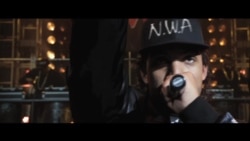The music genre known as gangster, or gangsta, rap was born in the poor, dangerous neighborhood of Compton, in Los Angeles, California. The violence of street life there and tense relations between the community and police influenced the sound. The music expressed the anger and distrust of the community.
Movie director F. Gary Gray explores that world through the story of N.W.A., the band that revolutionized rap in the 1980s.
(From the movie "Straight Outta Compton")
“You have a unique voice. The world needs to hear it.”
“They want N.W.A. Let’s give them N.W.A.”
One of the band members, O'Shea Jackson, grew up in Compton. He wrote songs on the school bus that reflected his experiences. He later took the stage name Ice Cube.
Ice Cube wrote one song about the gangster who got on his school bus and put a gun to a classmate’s head. He also wrote about the police who handcuffed him and threatened his parents because he happened to be at the wrong place the wrong time.
(From the movie "Straight Outta Compton")
Police: “Where do you think you’re going?”
Ice Cube: “I’m just trying to get home.”
Police: “You need to get back in the house or I will ruin your day.”
Mr. Gray’s film shows Ice Cube teaming up with his friends - Dre, an expert in music production, Eazy–E, a charismatic performer, as well as MC Ren and DJ Yella. They created the rap group N.W.A. and rapped about drugs, sex, violence and poverty.
“You’re listening to Compton’s very own Ice Cube, Eazy-E and Dr. Dre and. I gotta tell you, you are witnessing history.”
F. Gary Gray said he worked hard to keep the story as real as possible, including filming in Compton.
“This is not only history. It’s American history. It’s world history. And so, I got a chance to put on my journalist hat and be a historian.”
Ice Cube is one of the film’s producers. He remembers those times.
“Our music was like our weapon and that’s the most powerful weapon we got.”
He said the band did not use guns to fight back. Instead, they used a microphone. In his words, “at the end of the day, we’re still artists.”
Ice Cube’s son, O'Shea Jackson Jr., portrays him as a young man in the film.
Thinking about his father’s music, the younger Jackson said, “They talked about the things others were scared to talk about and shed light on the things that people needed to know.”
"Straight Outta Compton" has received mostly positive reviews from movie critics. However, some have argued that the film fails to address reports of abusive treatment of women by N.W.A. members.
But N.W.A.’s music caused severe public reaction outside of Compton. The media sharply criticized the group. The police had N.W.A.’s members under watch. The band even received a letter from the FBI. The letter asked the group to remove song lyrics that included threatening language directed at the police.
(From the movie "Straight Outta Compton")
“Your songs they glamorize gangs and drugs.
“Our art is a reflection of our reality”
In one scene in the film, Ice Cube speaks at a press conference about the group’s constitutional right to free speech. But his words were not especially helpful to the cause. N.W.A. members were repeatedly arrested and beaten up by police and by gangsters.
The film centers on N.W.A.'s rise to fame and the relationships among its members. It suggests that money and fame damaged those friendships and led to the break-up of the group.
The film’s depictions of police violence are especially powerful, coming after the police killings of unarmed black men such as Michael Brown in Ferguson, Missouri, and Eric Garner in New York City.
The film had a very successful opening weekend. It made more than $56 million in ticket sales in the United States last weekend. Industry experts are expecting the film to continue to attract big audiences this weekend.
I’m Anna Matteo.
VOA’s Penelope Poulou reported this story from Washington. Caty Weaver adapted it for Learning English. Ashley Thompson was the editor.
______________________________________________________________
Words in This Story
gangster – n. a member of a group of violent criminals
revolutionize – v. to change (something) very much or completely
charismatic – adj. having great charm or appeal
lyrics - n. the words of a song
portray – v. to play (a character) in a film, play, or television show
scene – n. a division of an act in a play during which the action takes place in a single place without a break in time
depiction – n. a description of (someone or something) through words, a story, etc.
positive – adj. showing or expressing support, approval, or agreement
address – v. to give attention to (something): to deal with (a matter, issue, problem, etc.)





